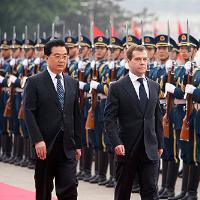Toward the end of World War II, the godfather of geopolitics, Nicholas Spykman, offered his famous analysis that was to become a rule of thumb for many strategists ever since: Who controls the Rimland rules Eurasia, and who rules Eurasia controls the destinies of the world. Spykman had a point. The two world wars of the 20th century came about largely due to attempts by European rivals to tilt the Eurasian balance of power in their own favor.
Russia was always a critical component in this balance, but now, due to the country's aging population and infrastructure, the 21st century seems to be leaving Moscow behind. Still, even as economic and political power shifts from the Atlantic to the Pacific, aging and forgotten Russia will not disappear from the Eurasian equation. A game-changing great-power rivalry could be brewing -- not between Russia and the West, but between Russia and China.
The common wisdom is that Russia is moving closer to China in order to counterbalance America and its European and Asian allies and partners. This has been helped along by Russia's membership in the Shanghai Cooperation Organization, as well as by trade volumes between the two countries reaching $40 billion in 2009. Moscow and Beijing also signed a document in 2004 ending their 300-year, 2,700-mile border dispute, allowing China to focus its military resources on Taiwan and the South China Sea, and Russia to make up for lost influence in its near-west.

